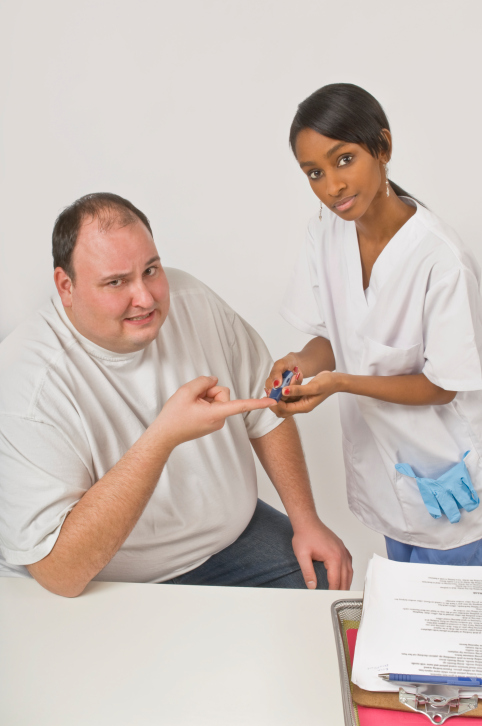What is diabetes? Diabetes Quiz
Reviewed by Robert Ehrman, MD
What is diabetes? Answer these simple (or maybe not so simple) questions and see how much you know.
- Diabetes is inherited. So, there is nothing I can do to prevent it. True or False?
- Type 2 diabetes is not as serious as type 1. Therefore, I don’t have to monitor my blood glucose so carefully. True or False?
- You can prevent or delay diabetes complications. True or False?
- You won’t feel any different if your blood glucose is in your target range. True or False?
- Everyone is at equal risk for getting diabetes. True or False?
- Being diagnosed with pre-diabetes makes it possible to prevent or delay the onset of diabetes. True or False?
Answers
Diabetes is inherited. So, there is nothing I can do to prevent it.True and False
Both types of diabetes, type 1 and type 2, have a genetic component. But the chances of inheriting diabetes is much greater for type 2. A person who develops type 1 diabetes was born with a genetic makeup that put them at higher risk for the disease. Somewhere along the line, something “environmental” happened to set off an immune response. This response caused the cells in the pancreas that make insulin—the beta cells—to be destroyed. However, just because a parent has type 1 diabetes doesn’t mean his/her children will develop the disease. But such children are at slightly higher risk of developing it than other children.
Your genes play a much greater role in type 2 diabetes. People who have a parent or a sibling with type 2 have a much greater risk of developing it.
Being overweight and inactive adds to the risk. If a person knows that he or she is at-risk for type 2 diabetes because of genetics, reaching and staying at a healthy weight and being physically active can help prevent or delay the onset of diabetes.
Type 2 diabetes is not as serious as type 1. Therefore, I don’t have to monitor my blood glucose so carefully. False
Both type 1 and type 2 are serious. Both can lead to complications, such as kidney failure, eye disease, and nerve damage. Whether you have type 1 or type 2, you have to take your diabetes care seriously.
Keeping your blood glucose between 90 and 130 mg/dL before meals, and less than 180 mg/dL two hours after the start of meals, is very important and can help you keep your diabetes on track. You should also keep your A1c (the average of your blood glucose level over the last two to three months) at or under 7 percent.
You can prevent or delay diabetes complications. True
Keeping your blood glucose in your target range day after day will help you feel better and prevent or delay possible diabetes complications, such as:
- Heart disease and stroke
- Eye disease that can lead to vision problems or even blindness
- Nerve damage that can cause your hands and feet to feel numb
- Kidney problems that can result in the need for dialysis or even transplant
- Gum disease and loss of teeth
You won’t feel any different if your blood glucose is in your target range. False
Keeping your blood glucose levels within your target range will help you feel better. You will:
- Be less tired
- Be less thirsty and urinate less often
- Heal more quickly and have fewer gum, skin or bladder infections
- Be less likely to have blurry vision or numb hands or feet
Everyone is at equal risk for getting diabetes.False
Some people may have a higher risk of having type 2 diabetes than others. If you are at-risk, ask your health care provider if you need to be tested for diabetes. People in this higher-risk group are those who:
- Are ages 45 and older (Note: If you are younger than 45, but have some of the risk factors for diabetes, you will want to be checked for diabetes starting at a younger age.)
- Are overweight
- Are African-American, Hispanic, Latino, Asian American, Pacific Islander or American Indian
- Have a parent, brother, or sister with diabetes
- Have high blood pressure (above 140/90)
- Have low HDL (good cholesterol) and high levels of LDL and total cholesterol (HDL and LDL combined)
- Have had diabetes when pregnant or given birth to a large baby (over 9 pounds)
- Are active less than three times a week
Being diagnosed with pre-diabetes makes it possible to prevent or delay the onset of diabetes. True
The terms “pre-diabetes” and “impaired fasting glucose” are used to describe a level of blood glucose that is higher than normal, but not high enough to be diabetes. In October of 2003, an international panel of diabetes experts recommended that the number which defines pre-diabetes be lowered. The goal of this change is to diagnose pre-diabetes earlier, when it is still possible to prevent diabetes. You will be diagnosed with pre-diabetes with any of the following:
- A before-meal blood glucose reading between 100 mg/dL and 126 mg/dL
- A blood glucose reading between 140 mg/dL and 199 mg/dL, done any time of day
- An oral glucose tolerance test showing blood glucose values between 140 mg/dL and 199 mg/dL at the two-hour point of the test





